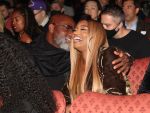SANFORD, Fla. (AP) — George Zimmerman‘s defense attorney began his final arguments Friday, trying to convince six jurors that the neighborhood watch volunteer acted in self-defense when he fatally shot 17-year-old Trayvon Martin.
Attorney Mark O’Mara told jurors the burden was on prosecutors, and they hadn’t proven Zimmerman’s guilt beyond a reasonable doubt. He said prosecutors built a case on a series hypothetical “could’ve beens” and “maybes.”
“If it hasn’t been proven, it’s not just there,” O’Mara said. “You can’t fill in the gaps. You can’t connect the dots. You’re not allowed to.”
The six jurors could begin deliberating later Friday.
A day earlier, prosecutors made said Zimmerman assumed Martin was a criminal who was up to no good when he confronted him in his neighborhood. A scuffle followed, and Zimmerman fired his gun.
“A teenager is dead. He is dead through no fault of his own,” prosecutor Bernie de la Rionda told the jurors during closing arguments. “He is dead because a man made assumptions. … Unfortunately because his assumptions were wrong, Trayvon Benjamin Martin no longer walks this Earth.”
Zimmerman is charged with second-degree murder, but the jury will also be allowed to consider manslaughter. Because of the way Florida law imposes sentences for crimes committed with a gun, the lesser charge could also carry a life sentence.
Judge Debra Nelson’s ruling to allow consideration of the manslaughter charge came despite the objections of Zimmerman’s lawyers. The jurors will have three options for their verdict: guilty of second-degree murder, guilty of manslaughter and not guilty.
Zimmerman attorney Don West had argued an all-or-nothing strategy, saying the only charge that should be put before the jury is second-degree murder.
“The state has charged him with second-degree murder. They should be required to prove it,” West said. “If they had wanted to charge him with manslaughter … they could do that.”
To win a second-degree murder conviction, prosecutors must prove Zimmerman showed ill will, hatred or spite — a burden the defense has argued the state failed to meet. To get a manslaughter conviction, prosecutors must show only that Zimmerman killed without lawful justification.
Allowing the jurors to consider manslaughter could give those who aren’t convinced the shooting amounted to murder a way to hold Zimmerman responsible for the death of the unarmed teen, said David Hill, an Orlando defense attorney with no connection to the case.
“From the jury’s point of view, if they don’t like the second-degree murder — and I can see why they don’t like it — he doesn’t want to give them any options to convict on lesser charges,” Hill said of the defense attorney.
Under Florida’s laws related to gun crimes, manslaughter could end up carrying a penalty as heavy as the one for second-degree murder: life in prison.
It is standard for prosecutors in Florida murder cases to ask that the jury be allowed to consider lesser charges that were not actually brought against the defendant. And it is not unusual for judges to grant such requests.
Prosecutor Richard Mantei also asked that the jury be allowed to consider third-degree murder, on the premise that Zimmerman committed child abuse when he shot the underage Martin. Zimmerman’s lawyer called that “bizarre” and “outrageous,” and the judge sided with the defense.
As the nation awaits a verdict in the trial, police and city leaders in Sanford and South Florida say they have taken precautionary steps for the possibility of mass protests or even civil unrest if Zimmerman, who identifies himself as Hispanic, is acquitted, particularly in African-American neighborhoods where passions run strongest over the case.
There were massive protests in Sanford and other cities across the country when authorities waited 44 days before arresting Zimmerman.
Zimmerman, 29, got into a scuffle with Martin after spotting the teen while driving through his gated townhouse complex on a rainy night in February 2012. Zimmerman has claimed he fired in self-defense after Martin sucker-punched him and began slamming his head into the pavement. Prosecutors have disputed his account and portrayed him as the aggressor.
During closing arguments, de la Rionda argued that Zimmerman showed ill will and hatred when he whispered profanities to a police dispatcher over his cellphone while following Martin through the neighborhood. He said Zimmerman “profiled” the teenager as a criminal.
“He assumed Trayvon Martin was a criminal,” de la Rionda said. “That is why we are here.”
O’Mara’s conversational tone during closing arguments was a contrast to prosecutor Bernie de la Rionda’s booming closing a day earlier.
The prosecutor told the jury Zimmerman wanted to be a police officer and that’s why he followed Martin. But “the law doesn’t allow people to take the law into their own hands,” de la Rionda said.
De la Rionda’s two-hour presentation also included moments when he seemed to appeal to jurors’ emotions by showing a head shot from Martin’s autopsy and a face-up crime scene photo of Martin. Several jurors looked away.















